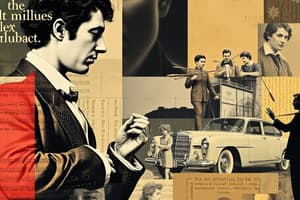Podcast
Questions and Answers
What is program music?
What is program music?
- A type of music that incorporates spoken narration
- Music that is purely abstract without any external associations
- Instrumental music that tells a story without words (correct)
- Vocal music that narrates a literary work
Which of the following is NOT a characteristic of program music?
Which of the following is NOT a characteristic of program music?
- It is distinguished from absolute or pure music
- It is exclusively composed for vocal ensembles (correct)
- It was popular during the Romantic period
- It has a title or program supplied by the composer
What is the term used by Hector Berlioz for the recurring melody representing the loved one in his Symphonie Fantastique?
What is the term used by Hector Berlioz for the recurring melody representing the loved one in his Symphonie Fantastique?
- Thematic transformation
- Idée fixe (correct)
- Cyclical form
- Leitmotif
Which of the following is NOT a form of orchestral program music mentioned in the text?
Which of the following is NOT a form of orchestral program music mentioned in the text?
What is the defining characteristic of a concert overture?
What is the defining characteristic of a concert overture?
Which of the following statements about Hector Berlioz's Symphonie Fantastique is NOT true?
Which of the following statements about Hector Berlioz's Symphonie Fantastique is NOT true?
What is the primary characteristic of a Romantic concert overture?
What is the primary characteristic of a Romantic concert overture?
Which of the following statements about the symphonic poem is NOT true?
Which of the following statements about the symphonic poem is NOT true?
Which of the following statements about incidental music is true?
Which of the following statements about incidental music is true?
Which of the following composers is known as the 'Poet of the Piano'?
Which of the following composers is known as the 'Poet of the Piano'?
What is the defining characteristic of a nocturne?
What is the defining characteristic of a nocturne?
Which of the following is NOT a characteristic of an impromptu?
Which of the following is NOT a characteristic of an impromptu?
Flashcards are hidden until you start studying
Study Notes
Program Music
- A form of instrumental music that tells a story without words
- Conveys images, poems, ideas, or scenes with literary or pictorial associations
- Distinguished from absolute music or pure music
- Most program music of the Romantic period was written for piano or orchestra
Orchestral Program Music
- Can take forms such as:
- Program Symphony
- Concert Overture
- Symphonic Poem
- Incidental Music
Program Symphony
- Composed in numerous movements, each with a descriptive title
- Example: Hector Berlioz's Symphonie Fantastique
- Features an "idée fixe" (fixed idea), a melody that reappears throughout the composition
- Berlioz used this technique to represent the loved one in his composition
Concert Overture
- Consists of only one movement, usually in sonata form
- Modeled after the opera overture, establishing the mood of the opera
- Independent composition, not intended to accompany a stage production
- Examples: Tchaikovsky's 1812 Overture and Romeo and Juliet Overture
Symphonic Poem
- Invented by Franz Liszt in the late 1840s and 1850s
- Composed for orchestra in one movement, written in various forms
- Developed into significant program music post-1860
- Examples: Les Preludes by Liszt and Till Eulenspiegel by Strauss
- Symbolized nationalism in music in the late 19th century
Incidental Music
- Designed to accompany dramatic stage performances
- Used between scenes or for important moments
- Can include background music, interludes, dances, or marches
- Example: Mendelssohn's "Wedding March"
Piano Music
- Became a popular instrument in the Romantic era
- Attracted middle-class people due to its ability to play both melody and harmony
- Frédéric François Chopin was a notable piano music expert, nicknamed the "Poet of the Piano"
- Other notable piano composers: Schumann, Mendelssohn, and Liszt
Piano Compositions
- Nocturne: created by John Field, adopted by Frédéric Chopin, reflects a melancholic night atmosphere
- Impromptu: refers to piano compositions with an extemporaneous character, notable examples by Chopin, Schubert, and Schumann
- Ballade: a narrative song without words, a one-movement piece for solo piano
- Prelude: a short mood piece of no prescribed form, conveys a specific idea or emotion
- Minuet: originated from French menuet, adapted from Italian minuetto, in triple meter (3/4)
- Scherzo: defined as "joke", played quickly with humor, similar to minuet in time signature and form
- Etude: French for "study" or "exercise", short pieces for technical practice
Studying That Suits You
Use AI to generate personalized quizzes and flashcards to suit your learning preferences.




